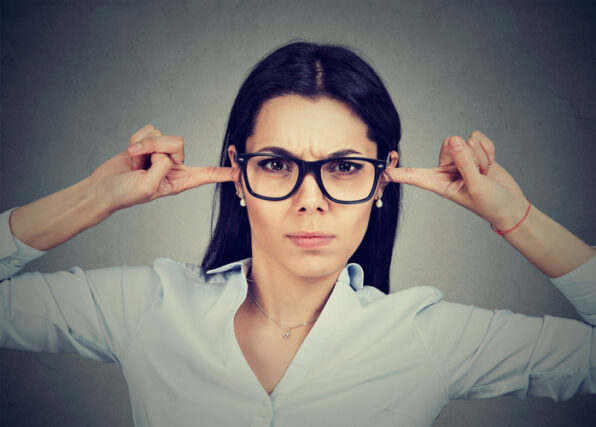We all have a bit of a blind spot in our self-awareness.

You might do or say something you think is totally normal, only to find out later that people really didn’t see it that way. With that in mind, here are some signs that you might be a tad clueless about your own behaviour. Maybe you’ll see a bit of yourself in these, and maybe you won’t. Either way, it’s a good opportunity for a little introspection and a laugh or two.
1. People often give you confused looks or raise their eyebrows after you speak.

Have you ever finished a sentence, only to be met with a sea of puzzled faces? If this happens more often than you’d like, it could be a sign that your words and actions aren’t aligning. Maybe you’re saying something unintentionally insensitive, or perhaps your jokes aren’t landing quite as well as you thought they would. It’s time to tune in to those non-verbal cues!
2. You’re surprised when people get offended or upset by your comments.

Do you find yourself thinking, “But I was just kidding!” or “They’re too sensitive!” when someone reacts negatively to something you said? It’s possible that your intentions and your impact are mismatched. Sometimes, we can be so focused on our own perspective that we fail to consider how our words might land on other people. It’s always a good idea to double-check your humour and be mindful of the feelings of those around you.
3. You frequently interrupt or talk over people in conversations.

It’s easy to get excited and want to share your thoughts, but if you’re constantly cutting people off mid-sentence, it can be a sign that you’re not fully present in the conversation. It can also be perceived as disrespectful and dismissive. Practice active listening and make an effort to let people finish their thoughts before jumping in with your own.
4. You tend to dominate conversations and rarely ask questions about anyone else.

We all love to talk about ourselves, but if you find that conversations always revolve around you and your experiences, it might be time to shift the focus. Show genuine interest in other people’s lives by asking questions, actively listening to their responses, and offering thoughtful feedback. Remember, conversations are a two-way street!
5. You’re unaware of your body language and how it affects people.

Our body language speaks volumes, often conveying more than our words ever could. Are you constantly fidgeting, avoiding eye contact, or crossing your arms defensively? These subtle cues can make you seem disinterested, unapproachable, or even hostile. Pay attention to your body language and make an effort to be more open and engaging.
6. You’re often told that you’re “too much” or “intense.”

Do people describe you as overwhelming, dramatic, or a bit too much to handle? While your energy and enthusiasm might be well-intentioned, you might be coming on too strong. Dial it back a notch and try to match the energy of the people around you. Remember, moderation is key!
7. You have difficulty reading social cues and understanding unspoken messages.

Social interactions are full of subtle cues and unspoken messages. If you find yourself missing these hints or misinterpreting them, it can lead to awkward situations and misunderstandings. Pay attention to people’s body language, tone of voice, and facial expressions. If you’re unsure of what someone is trying to convey, don’t be afraid to ask for clarification.
8. You’re oblivious to how your actions affect the people around you.

Sometimes, we get so caught up in our own world that we fail to consider the impact our actions have on other people. Maybe you’re always late, you leave your messes for everyone else to clean up, or you make promises you don’t keep. These seemingly small things can add up and create a negative impression of you. Make an effort to be more considerate and aware of how your actions affect those around you.
9. You find yourself in the same types of conflicts or misunderstandings repeatedly.
 Source: Unsplash
Source: Unsplash If you keep finding yourself in similar arguments or misunderstandings, it’s a sign that there might be a pattern of behaviour you’re not aware of. Take a step back and analyse the situation objectively. Are there any common threads or triggers? Once you identify the root of the problem, you can start working on changing your behaviour and breaking the cycle.
10. You rarely receive feedback from other people about your behaviour.

If people are hesitant to give you feedback, it could be because they’re afraid of hurting your feelings or causing conflict. This can be a major obstacle to self-awareness and growth. Encourage open communication and create a safe space where people feel comfortable sharing their honest opinions with you. Remember, feedback is a gift, even if it’s not always easy to hear.
11. You’re defensive and dismissive when people offer constructive criticism.

It’s natural to feel a little stung when someone criticises us, but if you consistently react defensively or dismiss their feedback altogether, it can be a sign that you’re not open to growth. Remember, constructive criticism is meant to help you improve, not to tear you down. Try to listen with an open mind and consider the other person’s perspective.
12. You have difficulty apologising or admitting when you’re wrong.

We all make mistakes, but owning up to them can be tough. If you find yourself struggling to apologise or admit fault, it could be a sign that you’re overly concerned with protecting your ego. Remember, humility and the willingness to acknowledge our shortcomings are essential for personal growth and healthy relationships.
13. You often compare yourself to everyone and feel jealous or insecure.

Comparison is the thief of joy, as they say. If you’re constantly measuring yourself against other people and feeling inadequate as a result, it can be a sign that you’re not fully accepting of yourself. Embrace your unique strengths and weaknesses, and focus on your own journey rather than trying to be someone you’re not.
14. You struggle to regulate your emotions and often react impulsively.

Emotions are powerful, but they can also lead us astray if we don’t learn to manage them effectively. If you find yourself lashing out, overreacting, or making impulsive decisions when you’re upset, it’s a sign that you need to work on your emotional regulation skills. Practice mindfulness, take deep breaths, and give yourself time to cool down before reacting.
15. You have difficulty setting boundaries and often feel taken advantage of.
 Source: Unsplash
Source: Unsplash Healthy boundaries are essential for protecting your well-being and maintaining healthy relationships. If you have trouble saying no, people-pleasing tendencies, or often feel like people are taking advantage of your generosity, it’s time to establish some firm boundaries. Learn to make your needs a priority and communicate your limits assertively.
16. You avoid difficult conversations or conflicts.
 Source: Unsplash
Source: Unsplash Conflict is a natural part of life, but it can be uncomfortable and challenging. If you tend to sweep issues under the rug, avoid difficult conversations, or bottle up your emotions, it can lead to resentment and unresolved problems. Learn to address conflict head-on in a respectful and constructive way.
17. You have a hard time understanding why people react negatively to you.
 Source: Unsplash
Source: Unsplash If you often find yourself bewildered by other people’s reactions to you, it’s a sign that you might be missing some important social cues or behaving in ways that are off-putting. Try to put yourself in their shoes and consider their perspective. If you’re still unsure, don’t hesitate to ask for feedback from a trusted friend or family member.
18. You’re unaware of your own biases and how they influence your interactions.

We all have biases, both conscious and unconscious, that shape how we see the world and interact with people. If you’re unaware of your own biases, it can lead to misunderstandings, unfair judgments, and even discrimination. Take some time to reflect on your beliefs and values, and consider how they might be influencing your behaviour.
19. You have difficulty recognising your own strengths and weaknesses.
 Source: Unsplash
Source: Unsplash Self-awareness involves having a realistic understanding of your own strengths and weaknesses. If you struggle to identify what you’re good at and what you need to work on, it can be difficult to set meaningful goals and make progress. Take some time for introspection, and consider asking for feedback from people to gain a more accurate picture of yourself.
20. You’re not actively working on personal growth and self-improvement.

Self-awareness is an ongoing process, not a destination. If you’re not actively looking for opportunities to learn, grow, and improve yourself, it’s easy to become stagnant and stuck in old patterns of behaviour. Embrace new challenges, ask for feedback, and be open to change. Remember, the journey of self-discovery is a lifelong adventure.




